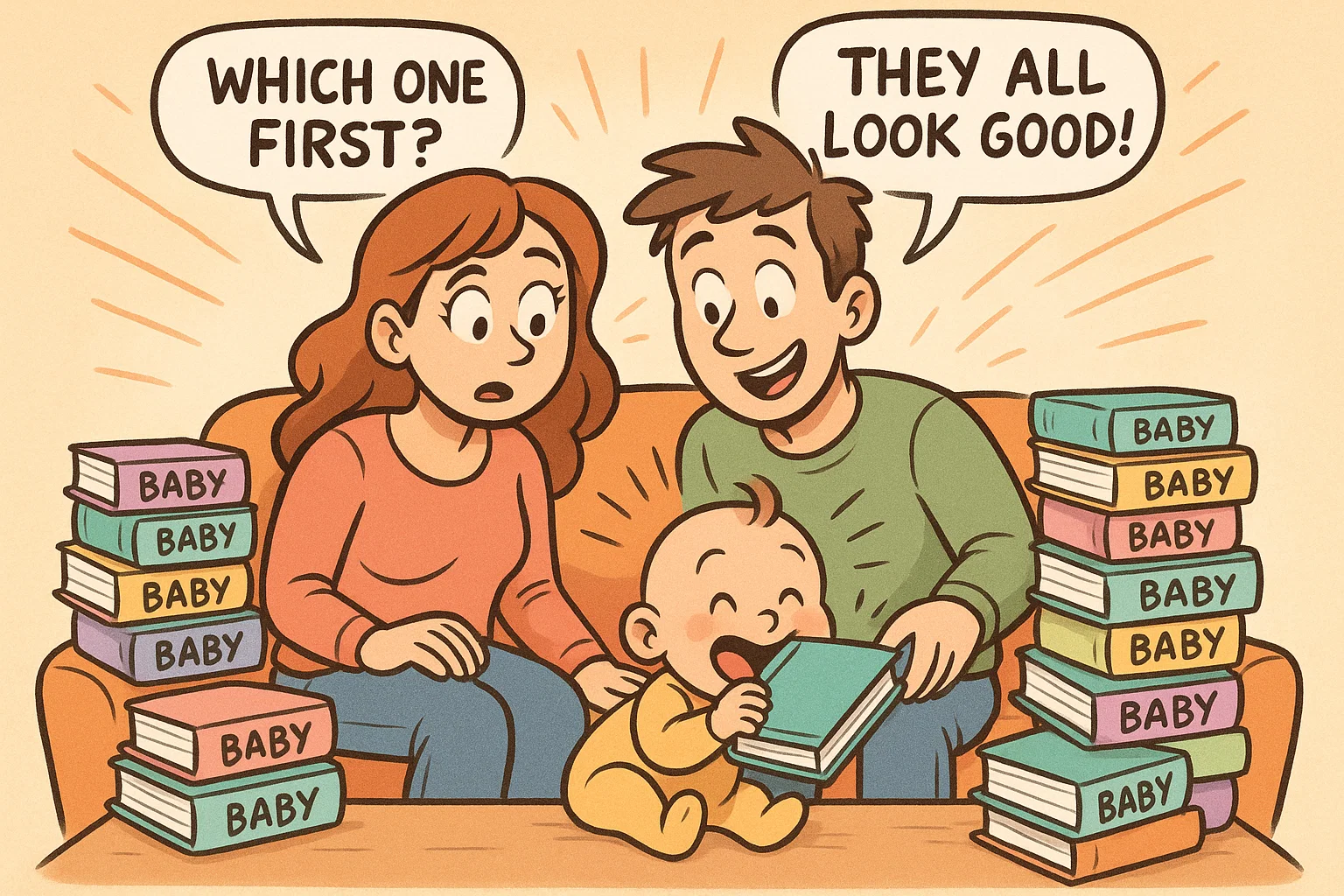The arrival of a new baby is a monumental, life-changing event. For many new parents, the mix of joy, excitement, and utter exhaustion can feel overwhelming. Suddenly, you’re responsible for a tiny human who communicates solely through cries and coos, and the flood of advice from well-meaning friends and family can leave you feeling lost at sea. It’s no wonder that one of the first things many parents-to-be do is seek out parenting book recommendations. You’re not just looking for a book to read; you’re searching for a lifeline—a reliable guide to help you navigate this complex and beautiful parenting journey.
Whether you’re a first-time mum or new dad, having a stack of best books at the ready can provide a much-needed sense of control. From decoding your newborn baby‘s cries to understanding brain development, these guides offer a roadmap for the first few months and beyond. This curated list cuts through the noise to bring you some of the most helpful, evidence-based, and compassionate parenting guides available, helping you feel confident and prepared for the beautiful chaos of parenthood.
Best Parenting Books for the First Year
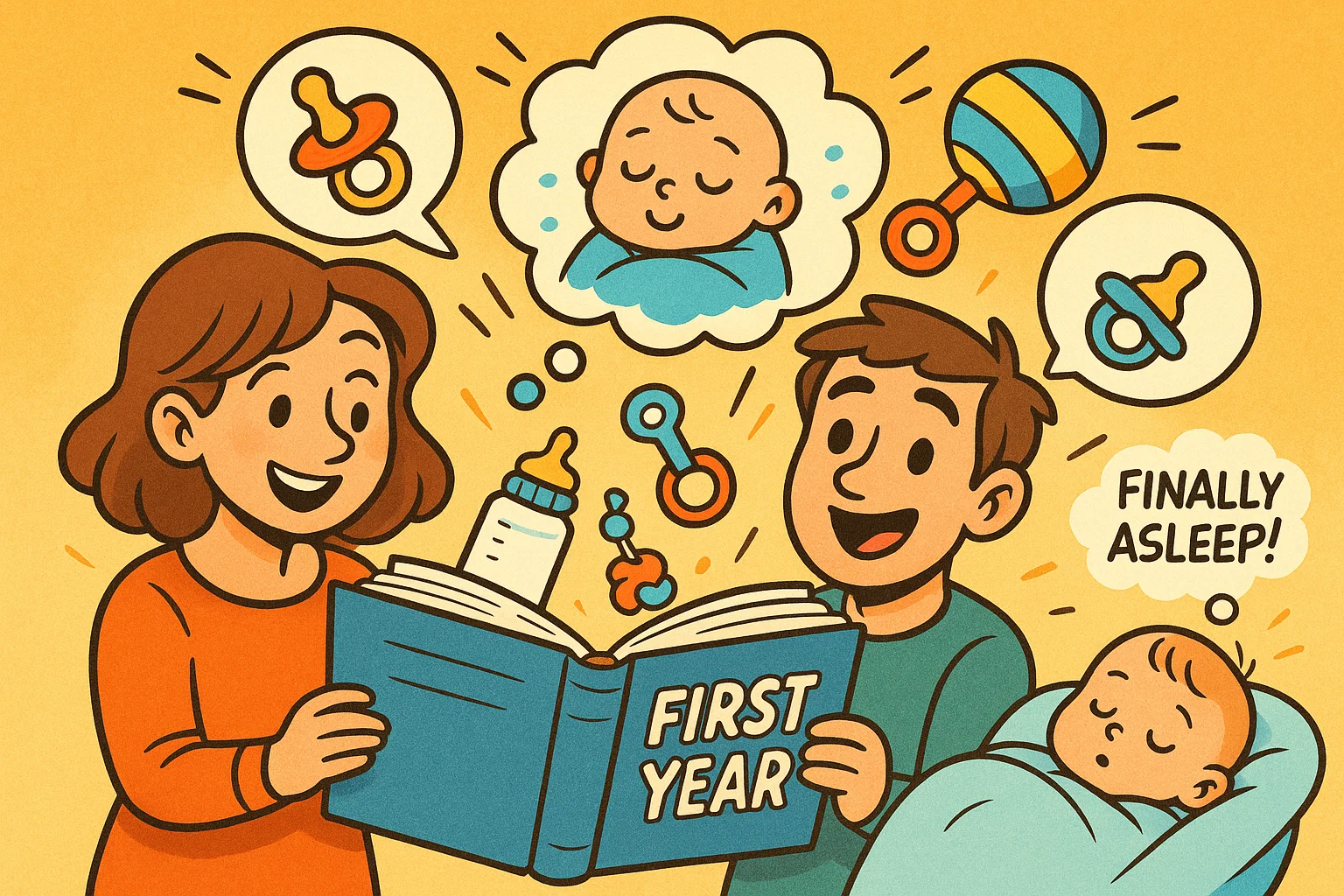
The first year is a whirlwind of growth and change, both for the baby and the parent. These top picks are often found on every baby registry and are considered essential reading for anyone embarking on their first-time parenting journey.
The Happiest Baby on the Block by Harvey Karp
This bestseller is a classic for a reason. Harvey Karp, a pediatrician, introduces the “5 S’s” for soothing a fussy baby: Swaddling, Side/Stomach Position, Shushing, Swinging, and Sucking. His theory that newborns need to be “woken up” from their “fourth trimester” is a powerful concept. This great read provides immediate, hands-on techniques that can calm even the fussiest newborn baby. The advice is simple, effective, and often works like magic. It’s a quick read and a must-have for any parent feeling overwhelmed by a crying baby.
Cribsheet by Emily Oster
For parents who appreciate data and a no-nonsense approach, Cribsheet by economist Emily Oster is an exceptional choice. Oster uses her expertise to analyze the scientific data behind common parenting questions, from sleep training to breastfeeding to solid foods. She presents the risks and benefits of various choices without judgment, allowing parents to make informed, data-driven decisions that align with their own values. This book helps you cut through the noise and feel confident in your choices, making it especially useful for those who want to move beyond anecdotal advice.
Babywise by Gary Ezzo & Robert Bucknam
Babywise offers a more structured approach to infant care, advocating for “parent-directed feeding” and scheduled routines. The core principle is that a predictable eat-wake-sleep cycle helps both the baby and the parents get adequate rest. While the book has faced some criticism, many parents-to-be find its structured routine to be a welcome roadmap. For those who thrive on schedules and predictability, this guide for parents can be a great way to establish order in the early, chaotic days.
Moms on Call by Laura Hunter & Jennifer Walker
Moms on Call is often considered a “recipe book” for newborn care. Written by two pediatric nurses, the book provides very specific, step-by-step instructions for feeding and sleep schedules, bathing, and general care. It’s an ideal book for new mums and dads who want a clear, prescriptive plan to follow. While not for everyone, it offers a sense of security for those who find comfort in detailed instructions.
Best Baby Development Books
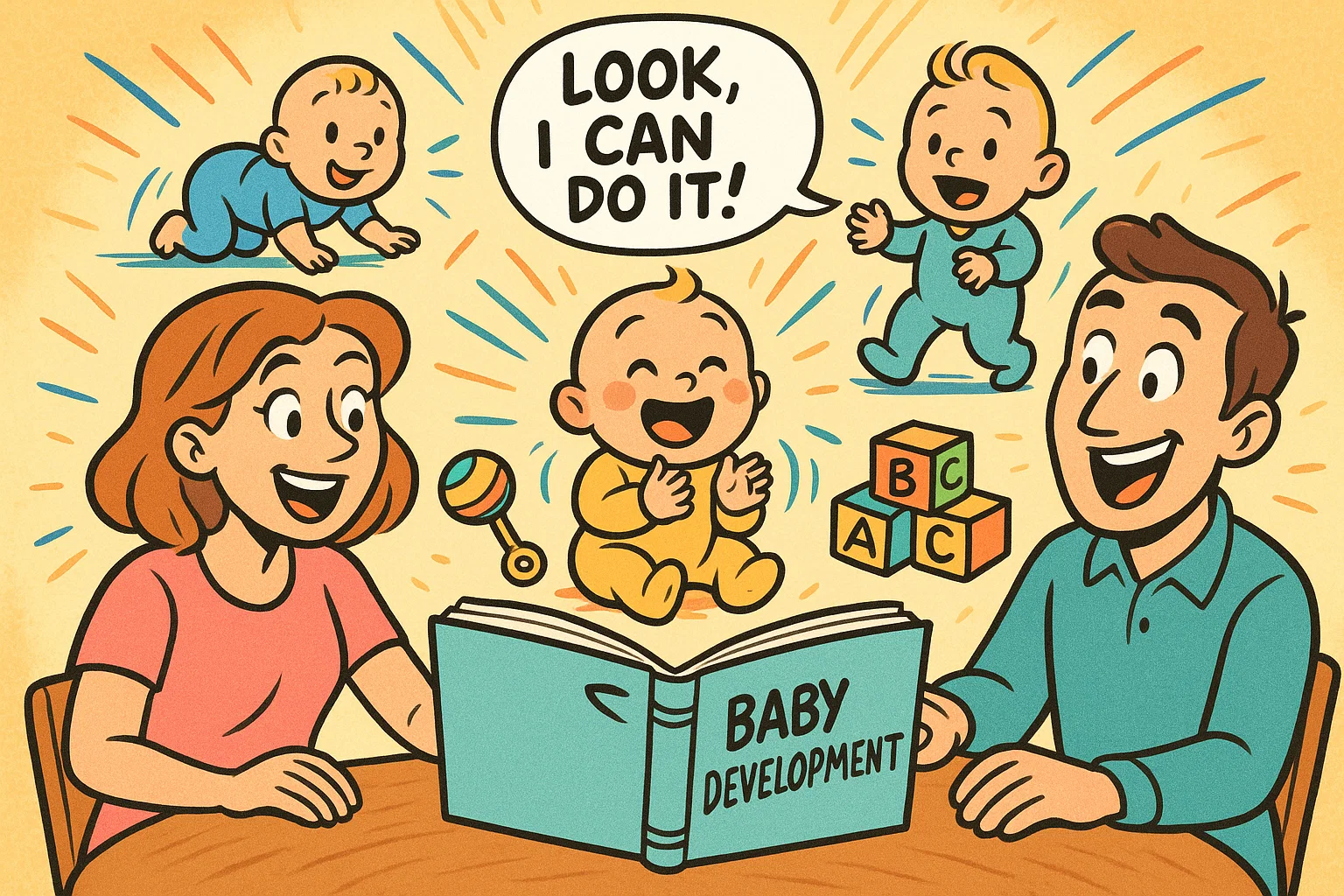
Understanding what’s going on inside your baby’s mind is a fascinating part of parenthood. These books focus on the developmental side, providing insight into your baby’s mental and emotional growth.
The Wonder Weeks by Hetty van de Rijt & Frans Plooij
This great book delves into the “mental leaps” or developmental milestones that babies experience in their first year. It explains the predictable fussy phases that babies go through before a significant leap in their cognitive skills. By identifying these periods, parents can understand why their baby is suddenly more clingy or irritable. Knowing that these changes are temporary and a sign of growth can be a huge relief. The book and accompanying app are highly popular and offer a reassuring perspective on normal child development.
Brain Rules for Baby by John Medina 📚
A renowned molecular biologist, John Medina, explores how a baby’s brain develops and offers evidence-based ways for parents to foster cognitive and emotional growth. Brain Rules for Baby debunks common myths and provides practical, science-backed tips for raising a confident and intelligent child. For a new dad or mum interested in the science behind why babies do what they do, this book is an exceptional and engaging read.
Caring for Your Baby and Young Child (American Academy of Pediatrics)
Authored by the American Academy of Pediatrics (AAP), this is the definitive, authoritative reference for baby health. While not a light read, it remains a crucial resource for every family. It covers everything from feeding schedules and vaccinations to common illnesses and safety tips. Think of it as a comprehensive medical textbook for parents, offering peace of mind and reliable information from a trusted source. No bookshelf is complete without it.
Gentle Parenting and Discipline Books
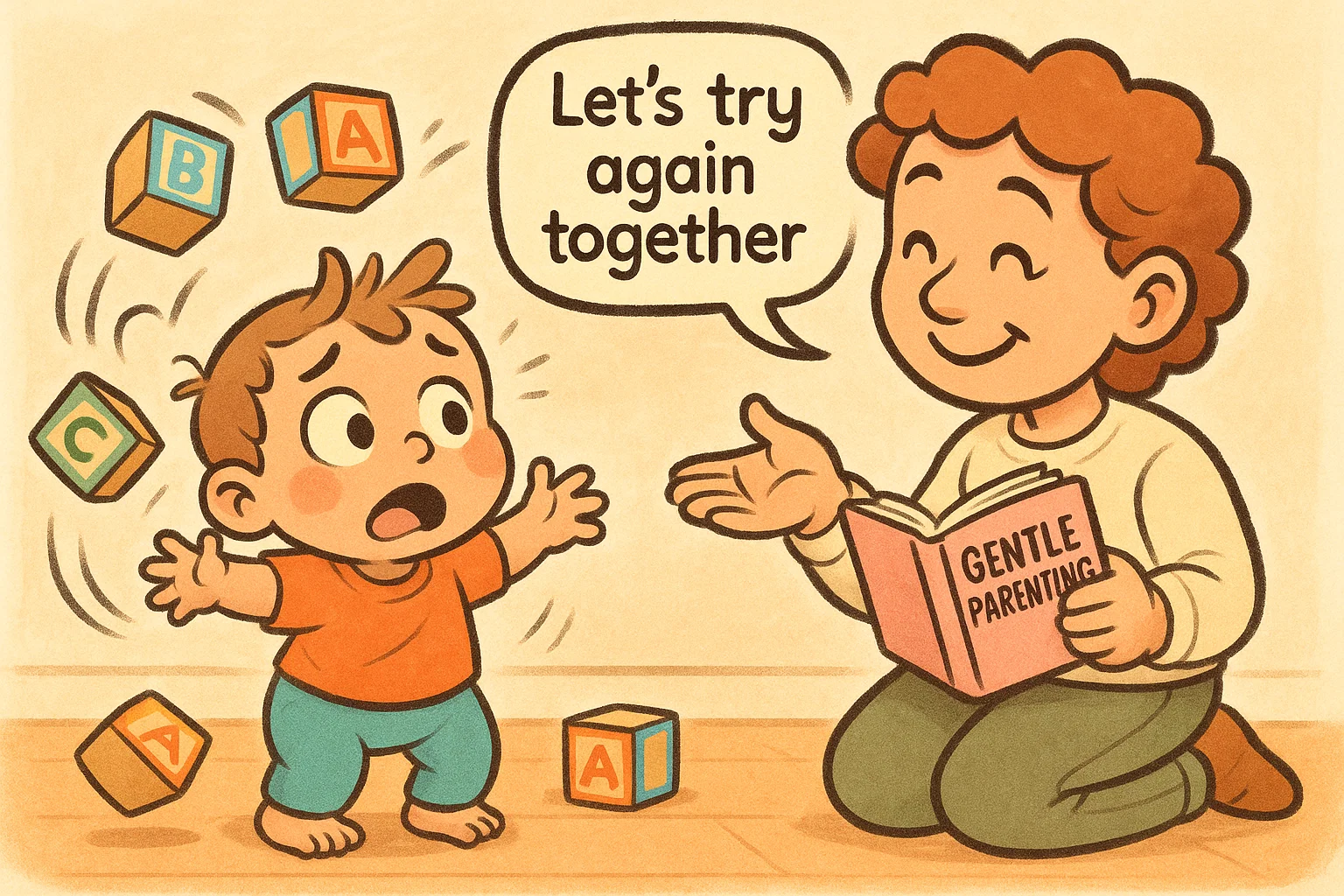
The way you interact with your child in their early years can shape their future. The following books focus on respectful, empathetic, and positive parenting approaches that build a strong foundation for a healthy parent-child relationship.
The Gentle Parenting Book by Sarah Ockwell-Smith
This book introduces the core principles of gentle parenting, which emphasizes empathy, understanding, and setting respectful boundaries. Sarah Ockwell-Smith provides a thoughtful alternative to traditional discipline methods, explaining how to respond to a child’s behavior with compassion rather than punishment. The book encourages parents to see a child’s actions as a form of communication, helping to build a secure attachment.
No Bad Kids by Janet Lansbury
Based on the philosophy of Magda Gerber and the RIE (Resources for Infant Educarers) approach, No Bad Kids by Janet Lansbury is an excellent resource for respectful parenting. Lansbury challenges the idea that toddlers are inherently “naughty” and provides a framework for setting firm, consistent boundaries while respecting a child’s feelings. This book offers a refreshing perspective on discipline that focuses on connection over control. It’s a must-read for anyone looking to build a trusting and secure relationship with their child from the start.
How to Talk So Kids Will Listen & Listen So Kids Will Talk by Adele Faber & Elaine Mazlish
Although not specific to newborns, this classic is a foundational read for any parent. The book provides practical communication tools to help parents connect with their children and solve problems collaboratively. It teaches skills like acknowledging feelings, using encouraging phrases, and working together to find solutions. The principles taught here are invaluable for building a strong foundation of communication that will serve you well as your child grows.
Motherhood and Self-Care Books
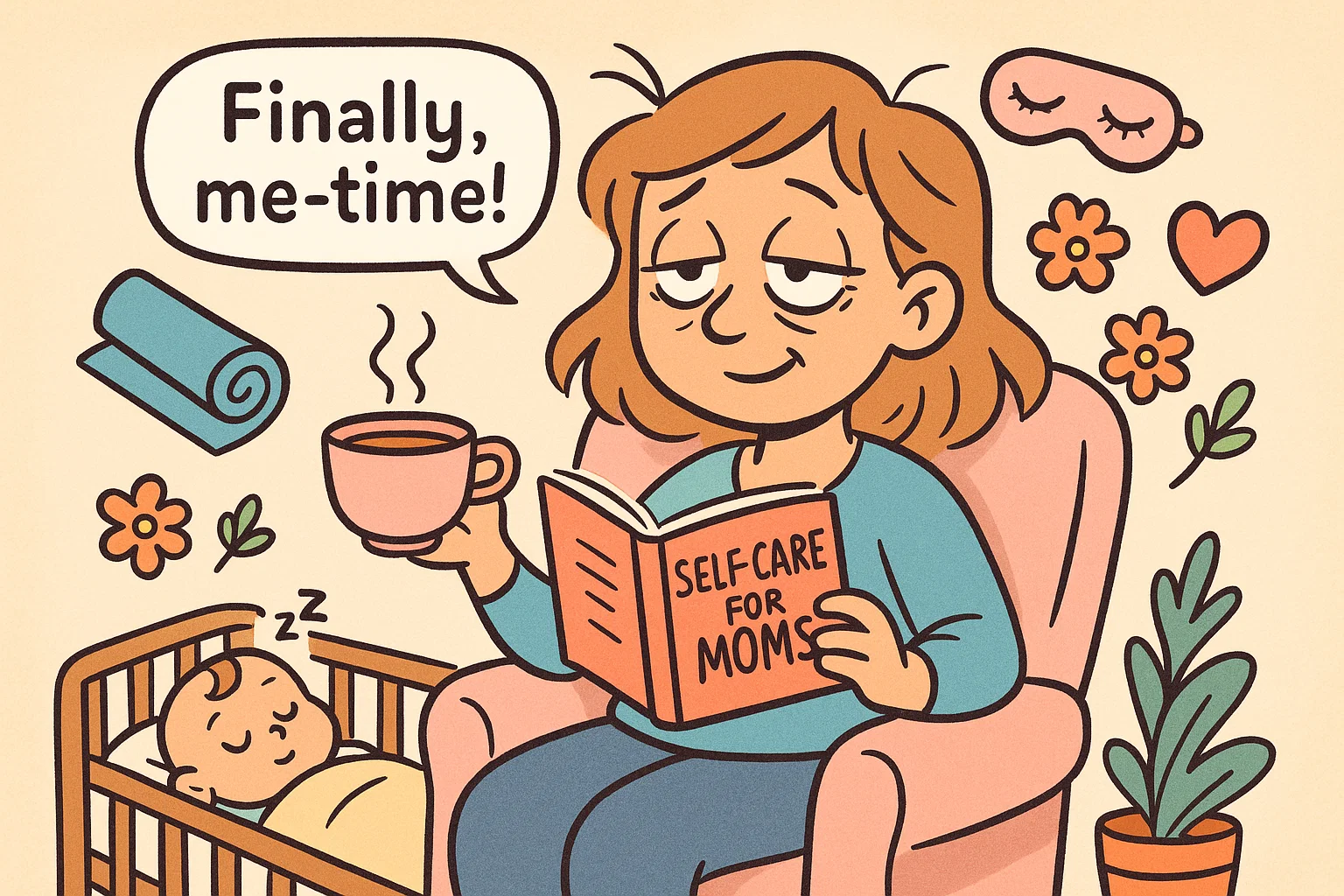
Parenthood is not just about the baby; it’s also about the parent. These books address the emotional, mental, and physical well-being of the primary caregiver, a crucial yet often overlooked aspect of the parenting journey.
Raising a Happier Mother by Anna Mathur
Anna Mathur, a psychotherapist, explores the inner landscape of motherhood. This book explores the common feelings of guilt, anxiety, and overwhelm that can accompany new mum life. It provides actionable strategies for prioritizing mental health, setting boundaries, and reconnecting with your identity beyond being a parent. It’s a compassionate and necessary reminder that a child’s well-being is deeply tied to the parent’s well-being.
The Postnatal Depletion Cure by Dr. Oscar Serrallach
Dr. Serrallach, a family practitioner, coined the term “postnatal depletion” to describe the physical and emotional exhaustion that many mothers experience after childbirth. This guide, perfect for new parents, offers a comprehensive approach to recovery, including advice on nutrition, sleep, and hormonal balance. The great book empowers mothers to understand and address their own needs, which is essential for sustainable parenthood.
Matrescence by Lucy Jones
Matrescence is the term for the physical, emotional, and social changes a woman goes through during her transition into motherhood. Lucy Jones‘s book validates this often-unspoken transformation. It helps new mums and parents-to-be understand that it’s normal to feel lost, overwhelmed, and changed by the experience. It offers a gentle, reassuring hand, confirming that you are not alone in this significant life transition.
Classic Baby Books for Every Family Library
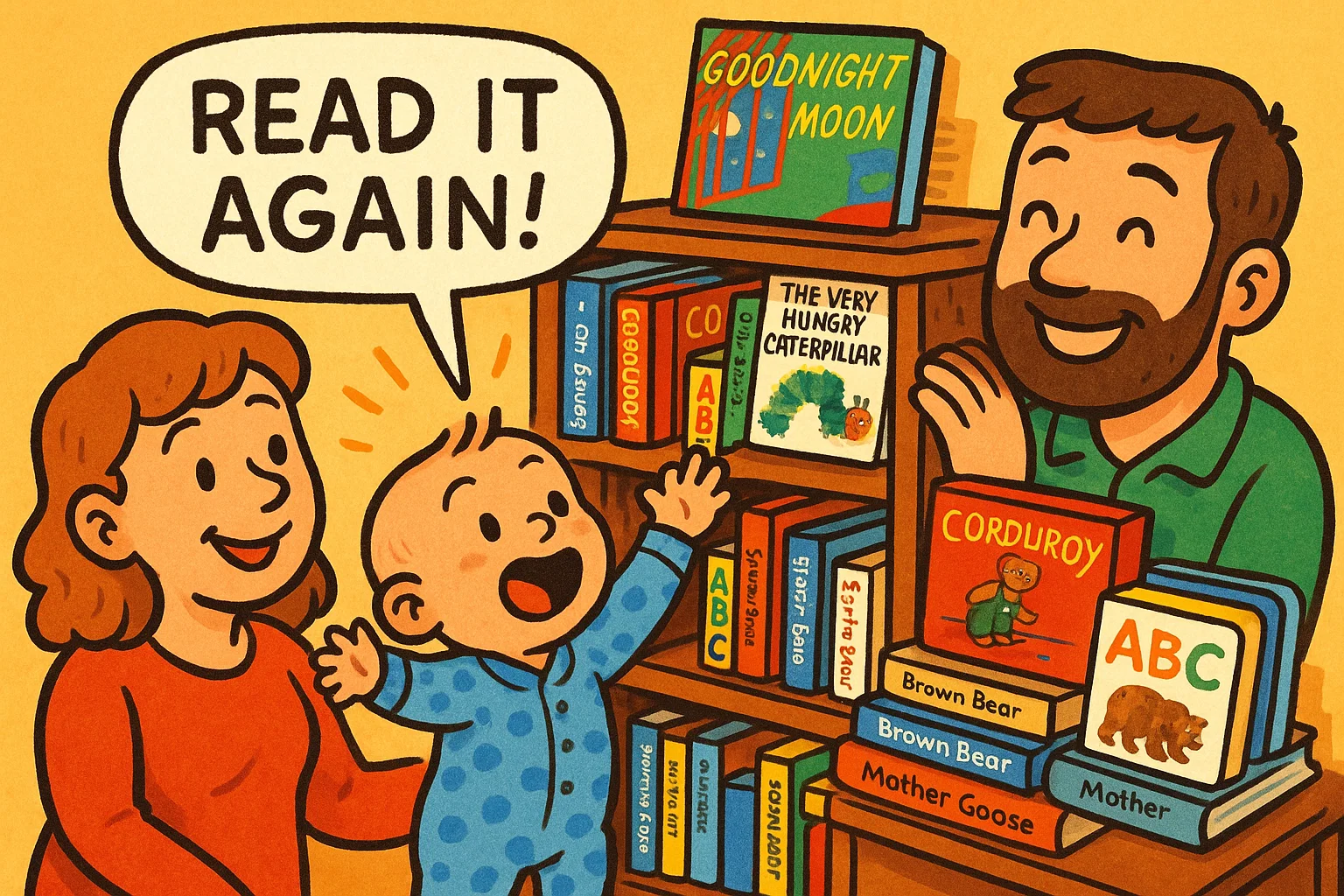
While parenting guides are essential, don’t forget the magic of children’s books. Reading aloud is one of the most powerful ways to bond with your baby and support their early brain development.
Timeless stories to read aloud 📖
- Goodnight Moon by Margaret Wise Brown: The rhythmic, soothing text and classic illustrations make it the perfect bedtime story for a new baby.
- The Very Hungry Caterpillar by Eric Carle: The vibrant colors and simple story introduce your baby to numbers, days of the week, and the magic of transformation.
- The Little Engine That Could by Watty Piper: A timeless story of perseverance and positive thinking that is sure to become a family favorite.
- Guess How Much I Love You by Sam McBratney: This sweet story is a beautiful expression of love, perfect for a quiet moment of bonding with your little one.
Touch-and-feel books
Touch-and-feel books, like Pat the Bunny by Dorothy Kunhardt, are essential for early sensory development. They engage a baby’s sense of touch and sight, helping to build cognitive connections. The interaction of a parent guiding their baby’s hand over different textures also strengthens the parent-child bond.
Interactive and personalized books
Personalized books, where the main character has your baby’s name, can make reading even more special. Interactive books with flaps, pop-ups, or musical elements can hold a baby’s attention and encourage engagement. These books aren’t just about the story; they’re about the shared experience of exploration and discovery.
Why Reading Baby Books Helps New Parents
Reading is more than just a pastime; for a new parent, it’s a powerful tool for self-education and emotional support. A good parenting book can serve as a trusted mentor, providing a sense of community and reassurance when you feel alone.
Benefits for confidence and bonding
When you’re a first-time parent, every decision can feel high-stakes. Is the baby sleeping enough? Is the baby eating enough? Are you doing this right? Reading the right book can significantly boost your confidence. By understanding the typical stages of child development and learning proven parenting strategies, you can replace anxiety with a sense of capability. This newfound confidence allows you to be more present, helping you forge a deeper, more meaningful bond with your baby. For a new dad, reading these books can be particularly empowering, providing concrete steps to take an active and confident role in their child’s life from day one.
Expert knowledge in accessible form
One of the greatest benefits of a parenting book is that it distills years of professional research and clinical experience into an easily digestible format. Experts in pediatrics, psychology, and neuroscience simplify complex topics like infant sleep cycles, infant nutrition, and emotional regulation. Research underscores that parenting knowledge about proper nutrition, safe sleep environments, how to soothe a crying baby, and how to show love and affection is critical for young children’s optimal development. For example, a book might explain why swaddling calms a baby or how simple routines support a baby’s nervous system. These insights help parents understand the “why” behind their baby’s behavior, leading to a more empathetic and effective response.
Encouraging healthy routines early
Many parenting guides offer practical advice for establishing healthy routines for newborns and infants. They cover essential topics such as:
- Feeding: Whether you choose to breastfeed, formula feed, or a combination, books can provide guidance on latching, milk supply, and feeding schedules.
- Sleep: Sleep training is a common topic, and books offer different approaches, from gentle methods to more structured plans. A book like The Happiest Baby on the Block by Harvey Karp offers immediate, soothing techniques that can be a lifesaver on a difficult night.
- Development: Understanding key milestones—like a baby’s first smile or the start of babbling—can help you appreciate and support your baby’s growth.
These books don’t just provide information; they empower you to create a stable, nurturing environment for your baby from the very beginning.
Choosing the Right Book for Your Parenting Style
With so many book recommendations out there, how do you choose the right one for you? Consider the following factors to find a guide that aligns with your personality and philosophy.
Structured routine vs. flexible parenting
- Structured: If you are a person who thrives on schedules and routine, you might prefer books like Babywise or Moms on Call. They offer a clear plan and a sense of control.
- Flexible: If you prefer a more go-with-the-flow approach, books like The Gentle Parenting Book or The Whole-Brain Child might be a better fit. These books focus on understanding your baby’s cues and responding with empathy.
Evidence-based vs. experience-based advice
- Evidence-based: Books like Cribsheet or Brain Rules for Baby are for the parent who wants to see the data. They provide a scientific foundation for the advice they offer.
- Experience-based: Books like The Happiest Baby on the Block or The Gentle Parenting Book often draw on the author’s extensive clinical or personal experience, providing wisdom that comes from years of working with families.
Emotional vs. practical guidance
- Emotional: Some books, such as Raising a Happier Mother or Matrescence, focus on the emotional and psychological aspects of parenthood. They provide reassurance and validation for the parent.
- Practical: Books like The Happiest Baby on the Block and Moms on Call are highly practical, offering specific, step-by-step instructions for everyday tasks.
A balance of both is often the best approach. A new mum or dad can find comfort in a book that validates their feelings while also having a practical guide to help them navigate the day-to-day challenges of a newborn.
Final Thoughts on Best Baby Books for New Parents
Embarking on parenthood is a profound and rewarding experience, but it’s okay to admit that it can be incredibly challenging. Parenting books for new parents are more than just guides; they are a source of empowerment, offering both knowledge and reassurance. They offer guidance and reassurance, helping you navigate the uncertainties of your baby’s first year.
As you build your library, remember that no single book has all the answers. The best approach is to draw from a variety of sources to build a toolkit of strategies that feel authentic to you. By reading and learning, you can better understand your child and, most importantly, grow in confidence as a parent. These guides can help you build a strong foundation for a loving, connected, and confident family.


